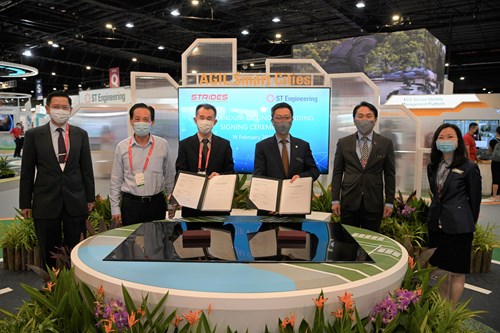Shell has also completed the upgrading of its facility in Singapore which will enable blending of SAF in Singapore. SAF is approved for use in aircraft operating today only when blended in a ratio of up to 50% with conventional jet fuel.1 Having a blending facility in the region enables a more efficient operation by moving neat SAF in bulk from production sources to the blending facility and then delivering blended SAF parcels to where it is needed.
The announcement represents a significant milestone for the aviation industry in Asia, as the enhanced SAF supply chain capabilities increase customer’s access to SAF. For the first time in Singapore, customers can now reduce emissions by flying on SAF.
The SAF supplied is made from waste products and sustainable feedstocks and will be blended with conventional jet fuel. The first batch of SAF is blended in Europe and aims to test and verify the supply chain for SAF that Shell has established in Asia. Shell seeks to commence blending at its Singapore facilities for subsequent batches.
Building supply chain capabilities to blend, handle and distribute SAF is critical in enabling more customers access to SAF, allowing us to help quicken the pace of decarbonising the aviation sector. In its neat form, SAF can reduce lifecycle emissions by up to 80% compared to conventional fuel.2
Jan Toschka, Global President, Shell Aviation, said: “Today’s announcement is an example of how we are building the capabilities now to accelerate the use of SAF in Asia. We want to become a sustainability leader in this important market. Alongside investing in our capabilities to produce SAF, we are also focused on developing the regional infrastructure needed to get the fuel to our customers at their key locations. Through leveraging our extensive refuelling network, I am proud that we are helping our customers to decarbonise by becoming the first supplier of SAF in Singapore.”
Lee Seow Hiang, CEO, Changi Airport Group (CAG), remarked that “Aircraft emissions and airport activities contribute to an airport’s carbon footprint. Changi Airport believes that SAF is one of the keys to unlock the future to a more sustainable air travel industry. We are committed to working actively with airlines, industry players and government agencies on the adoption of SAF with the goal of advancing Changi Airport as a sustainable aviation hub.”
Shell has announced its ambition to produce around 2 million tonnes of SAF a year by 2025 globally. To support this, Shell outlined plans for a biofuels facility, subject to final investment decision, at the Shell Energy and Chemicals Park Singapore. The facility has the ability to produce 550,000 tonnes of low-carbon fuels a year, including SAF.
Ng Chin Hwee, CEO, SIA Engineering Company (SIAEC), said: “We welcome Shell’s announcement to blend SAF in the Asia Pacific region. Together with Shell and like-minded companies in the aviation value chain, SIAEC supports the aviation industry towards its net zero carbon emissions goal. In this regard, we are one of the first maintenance, repair and overhaul (MRO) service providers to successfully conduct a trial using blended SAF to perform engine tests at our engine test facility. The success of the trial marks SIAEC’s capability and operational readiness to offer sustainability-centric services to our customers.”
Enabling SAF in Singapore and Asia is a major step forward and Shell will continue to work with players in the aviation ecosystem to decarbonise the sector. In conjunction with this announcement, Shell has launched a new set of sketches – Singapore: A 21st Century Energy Hub, that looks at sectors like aviation against the context of possible pathways, including rapid and constrained decarbonisation, that Singapore could take as the energy transition progresses.
Notes to editors
About Shell Aviation
With one of the most extensive refuelling networks in the world Shell Aviation supplies fuel, lubricants, and sustainable solutions in more than 60 countries. Customers range from the world’s largest airlines to private pilots.
Shell’s target is to become a net-zero emissions energy business by 2050, in step with society’s progress towards the goal of the UN Paris Agreement on climate change. Shell aims to reduce the carbon intensity of the energy products we sell to our customers by 100% by 2050 and by around 45% by 2035.
Shell Aviation’s carbon management strategy aims to help our customers decarbonise by avoiding emissions on the ground, reducing emissions principally through the use of Sustainable Aviation Fuel, and offsetting emissions through the use of carbon credits, specifically nature-based solutions. Shell Aviation plays many different roles in this strategy; a fuel supplier (renewable and conventional), a technology partner, and proponent of energy solutions for airports. We actively collaborate across the industry to deliver more sustainable solutions for aviation. Examples include our work with World Energy, SkyNRG, Amazon Air, Neste, Red Rock, Rolls-Royce, and at San Francisco Airport. Shell Aviation is proud to be a member of “The Clean Skies for Tomorrow Coalition” and the UK government’s Jet Zero Council.
Further information can be found at Shell Aviation and Flightpath, our conversation series featuring expert perspectives on the issues facing aviation.
Enquiries
APAC Media Relations, Shell: [email protected]










